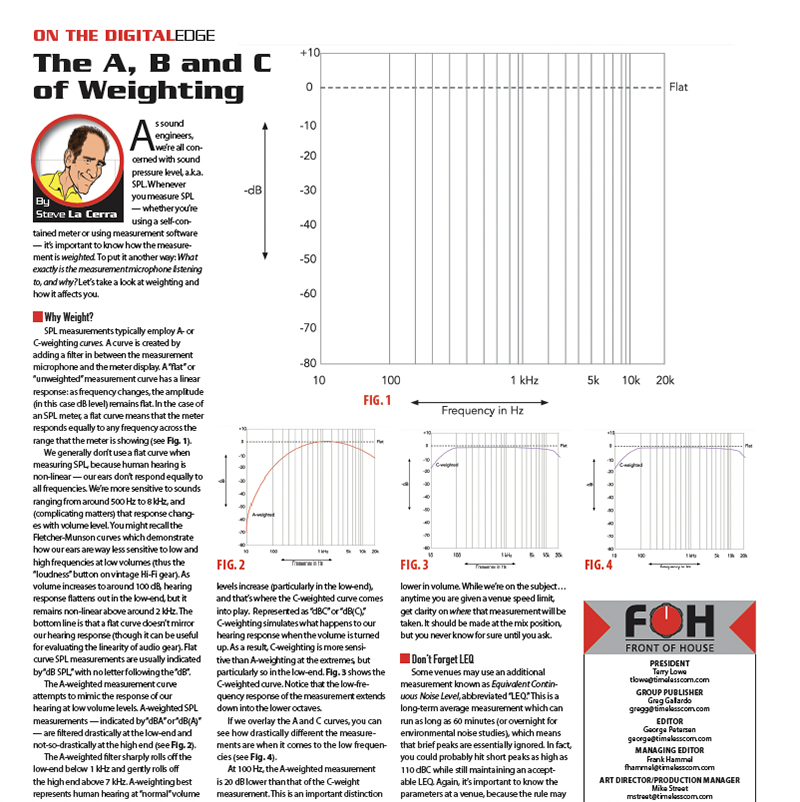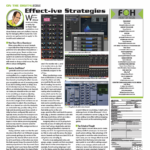
As the live sound industry slowly returns to a more normal workflow in what hopefully is the post-Covid era, I’ve found that some of us (myself included) are shaking off the rust that formed during the past year and a half due to lack of activity. Most of the mental muscles have returned but it seems like some folks need a reminder regarding show protocol. So here are a few things that you might want to do — or avoid doing — at front of house.
Checking, 1-2-3
Check with the systems or house engineer before loading a scene. The console is sitting there at FOH, waiting for you to sound check. You’ve got a scene on your thumb drive ready to load, but are you sure of what’s going to happen when you load it? Are you absolutely certain that you won’t cause an audio train wreck? If the mains have been muted, you won’t hear a sound when you load that file, but if the P.A. is open, you might cause anything ranging from a soft bump in the subs to uncontrollable feedback in the mains or monitors if your channels come up unmuted (one reason why it’s a smart idea to save your files with the outputs muted). Your mix file may indeed be great — for a different venue. Asking the systems tech first takes no time, and can potentially save a loudspeaker or amplifier.
Total Recall
Also, ask about output assignments before recalling a scene. Part Two (re: the above section) is asking whether or not the outputs have been “safed” from recall. At some venues, it’s not a big deal to recreate output assignments (“output 15 is left, output 16 is right, output 14 feeds the subs”), but at other venues there may be extensive fill and/or balcony routings that have been painstakingly tuned. It would be a better idea if loading your show did not blow out those settings (although a competent systems engineer would have those settings saved somewhere). If you don’t know how to “safe” the outputs on a particular desk, defer to someone who does (and check out the May 2021 On The Digital Edge).
BYOT
Bring your own talkback microphone! Does this really need explanation in this day and age? Spend a hundred bucks on a switched vocal mic and keep it in your workbag. While you’re at it, do the same with headphones.
Do Not Disturb…
Do not disturb the support act’s engineer during their show. This happened to me last week and I almost decked the headlining act’s engineer. Our show had started, I was mixing and had my hands on the desk. He reached in front of me across the desk to turn on his laptop. Really? I guess it was just so important for his laptop to be running during my set. After all, what would I do without it? Rude to the max! Later, he barely gave me time to disconnect my headphones after the show before elbowing his way into my space. It wasn’t worth ruining an otherwise good day over his inability to show some respect for his peers. Of course, that goes both ways.
R-E-S-P-E-C-T
Respect the local ordinances. We’ve all worked at venues that have a speed limit, and local residents won’t forget how annoying it can be to hear tonight’s metal band in the kitchen while they’re preparing dinner for the kids. Keep the gig on the calendar: Play by the rules.
Keep Cool!
Also last week (at a different venue), I had some major technical issues at the start of the show. The HF horns on the house right P.A. took a late dinner break (i.e., shut down). As you might imagine, some of the patrons started ranting at me, and we all know how eloquent and polite drunk fans can be. It might surprise the fans to know that I was equally upset over this, but they wouldn’t know by my reaction. My house tech for the night, Rick, was doing everything possible to fix the problem, which he eventually did. After the show he thanked me for not flipping out on him. I’m old enough to have learned that flipping out doesn’t make the fix happen any faster, and certainly doesn’t make the systems tech want to make the fix happen any faster. Flipping out on someone also makes you feel lousy when you put your head on the pillow.
Besides, I had other concerns like, Where in the devil’s name is that slap delay coming from? Yes, the building was a nasty acoustic environment, but this delay was electronic, not a product of the room acoustics. And it wasn’t there during sound check. Initially I thought it was the way the drummer was playing because the echo was in time with the drums — but that was only for one song! The obvious thing to check was whether or not the snare drum channel was being routed to the vocal delay. It wasn’t. Rick and I slowly went through the routing pages on the console until we found that one of the outputs had a 272 ms delay on it. That was definitely not something I dialed in during sound check! How did it get there? I’ll never know, but the show certainly sounded much better after we solved those two issues!
The Chatterbox
Do not try to have a conversation with someone who is mixing. This one boggles my mind. Relevant comments like “should we bump up the subs a few dB?” notwithstanding, it’s really not cool to try and talk to someone who is mixing. It’s distracting, annoying and disrespectful to the artist — who might at a moment’s notice change the set list or ask an engineer to stop that annoying feedback they’re hearing on stage.
L.B.N.L. — Last, But Not Least
Don’t engage with a heckler. It’s never productive.
Steve “Woody” La Cerra is the tour manager and front of house engineer for Blue Öyster Cult.



